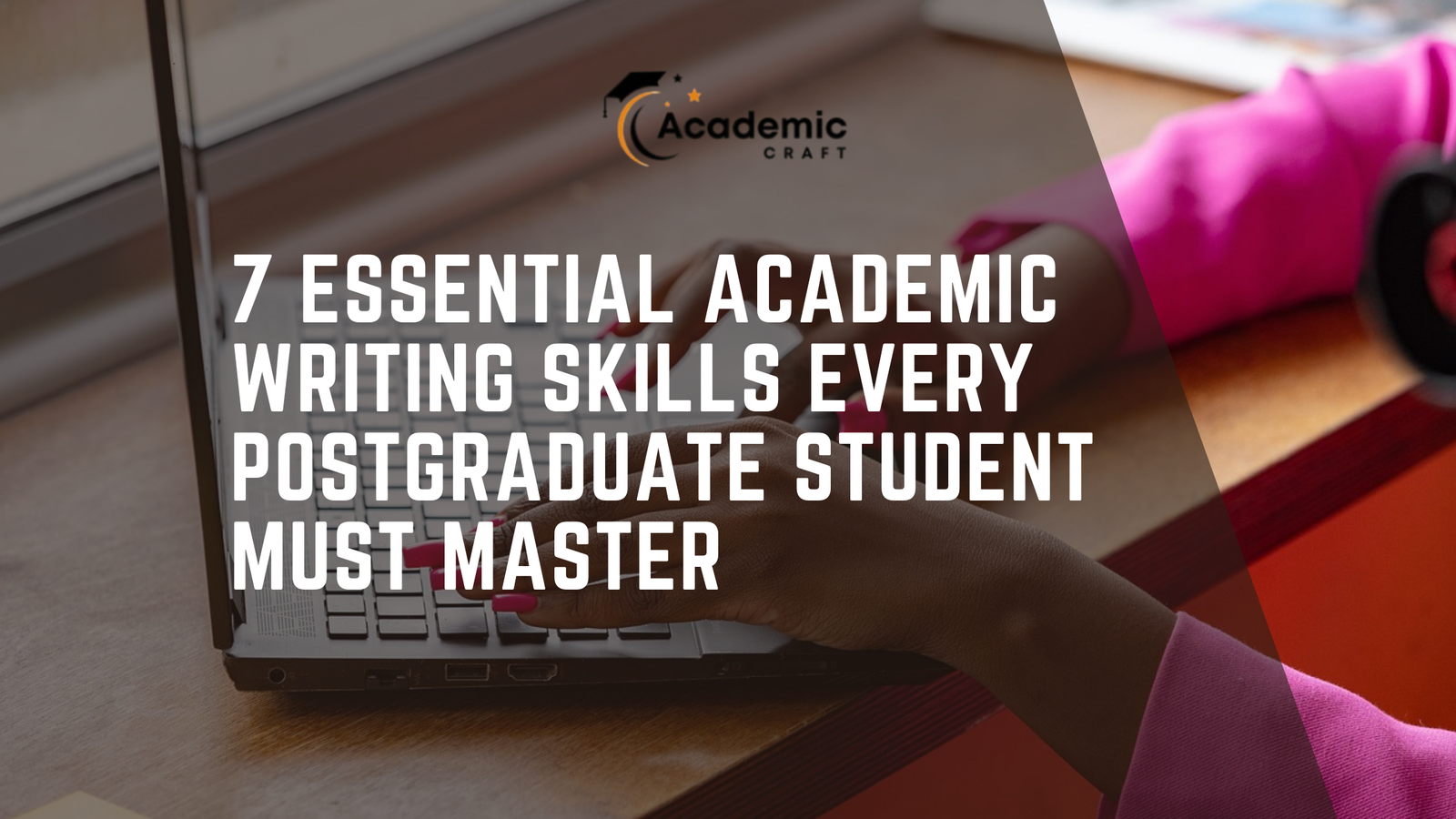Mastering academic writing is not only about completing your thesis or dissertation; it’s about learning to think, argue, and express ideas with confidence. And to grow as a scholar, you must develop the essential academic writing skills that help you write clearly, argue powerfully, and communicate your research with impact.
Below are the seven essential academic writing skills every postgraduate student must master. Each skill builds on the other to help you write with clarity and purpose.
1. Critical Thinking and Argumentation
The foundation of all essential academic writing skills is critical thinking. Academic writing involves understanding, questioning, and presenting your own point of view. You must be able to read research papers and ask: What is missing here? Why is this important? Then, use logic and evidence to support your ideas.
Try building an argument like a debate. Start with a claim, add supporting facts, and address possible counterarguments. This approach shows you are not just collecting information but engaging with it. For a deeper dive into how to structure arguments, visit University of Manchester’s Academic Phrasebank.
2. Clear Structure and Logical Flow

A strong paper needs more than good ideas and structure. Think of your work as a story. Every section should flow smoothly into the next. Begin with a clear introduction that tells your readers what to expect. Organize the main body into sections with topic sentences. End with a conclusion that ties everything together.
Use this simple test: Read your work out loud. If a paragraph feels disconnected, adjust it. Tools like Grammarly’s sentence clarity guide can also help you identify areas that may confuse readers.
A clear structure makes your argument strong and keeps your reader focused. It is one of the most essential academic writing skills that separates average writing from professional scholarship.
3. Evidence, Source Integration, and Scholarly Voice
Every claim you make in your academic writing should come from credible sources. And it’s not enough to list quotes and citations; you must integrate sources so your voice leads the discussion. This means summarizing ideas, comparing findings, and showing how they support your idea.
For example, instead of saying, “Researcher A said X,” write, “Researcher A’s findings confirm that X plays a central role in Y.” This approach keeps your voice in control. Always balance your opinion with evidence. Learn more about proper citation and source integration from the Purdue Online Writing Lab (OWL).
This balance between your insights and scholarly evidence defines mature academic writing. It is a vital part of the essential academic writing skills that postgraduate students must learn.
READ ALSO: The Beginner’s Complete Guide to Academic Referencing Styles: APA, MLA, Harvard & More
4. Precision in Language, Style, and Academic Tone
Long sentences and complex words do not make you sound smarter; they make your work harder to read. Use clear, simple language. Write in an active voice where possible. Avoid filler phrases like “it is important to note that.”
Every discipline has its own writing tone. Science papers may prefer objective and passive forms, while humanities papers may allow a personal voice.
Precision is one of the essential academic writing skills that makes your message unique. When your words are clear, your readers trust your ideas.
5. Revision, Editing, and Self-Assessment

No first draft is perfect. Writing is rewriting. This is one of the most powerful essential academic writing skills to learn. After the first draft, take a break. Then, reread your work with fresh eyes. Start by checking the structure and argument flow. Then move on to clarity and grammar.
Use a three-step revision method:
- Content check: Are your ideas complete and logical?
- Style check: Are your sentences clear and consistent?
- Proof check: Fix grammar, punctuation, and formatting errors.
Tools like Hemingway Editor can highlight unclear sentences, and Grammarly can help with grammar and tone. But remember, tools assist you; they do not replace your judgment.
6. Feedback and Collaboration
Feedback helps you grow. Many postgraduate students don’t like criticism, but it is one of the best ways to improve writing. Ask for feedback early from your supervisor, peers, or writing group. When someone comments on your work, do not take it personally. Instead, look for patterns in their suggestions. Are they pointing out arguments that are unclear or weak transitions?
Also, offer feedback to others. Reviewing a peer’s work trains your eye to spot issues in your own. For example, the Writing Center at UNC has excellent resources on how to give and receive feedback effectively.
Collaboration is a hidden part of essential academic writing skills.
7. Time Management, Motivation, and Writing Resilience
Even the most skilled postgraduate writers struggle with time and motivation. Building strong writing habits is key. Set small daily goals. Break big tasks into chunks, like outlining one section or revising one paragraph.
Writer’s block happens to everyone. Instead of waiting for inspiration, start writing anything related to your topic. Progress builds motivation.
Time management and resilience are essential academic writing skills that keep you productive and focused during long research projects.
READ ALSO: How to Choose the Perfect Master’s Thesis Topic (Even If You’re Confused)
Bonus: Tools and Technologies to Support Your Writing
Modern postgraduate students have many tools to make academic writing easier. Here are a few:
- Reference managers: Zotero, Mendeley, and EndNote
- Writing tools: Scrivener, Google Docs, and Notion
- Grammar tools: ProWritingAid and Grammarly
- Backup systems: Always save work in the cloud and keep local copies
Using these tools wisely helps strengthen your workflow and keep your writing organized. But remember to maintain integrity. Do not rely on AI tools to write for you; use them to support your learning and improve your writing.
Conclusion
Mastering the essential academic writing skills is a journey, not a quick fix. It takes patience, practice, and persistence. Every draft you write helps you grow. Every feedback comment sharpens your voice. And every revision polishes your ideas.
Academic writing is about making progress. And when you combine discipline with curiosity, you will not only complete your degree; you will become a more confident scholar ready to share your voice with the world.
Click here and send us a direct message if you need help with your academic writing project.



